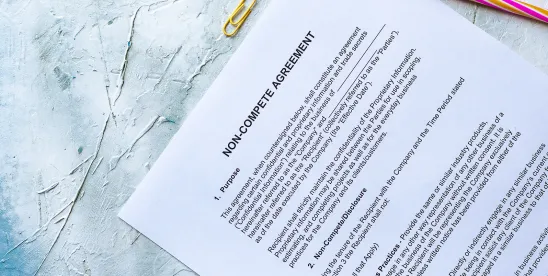On April 23, 2024, the Federal Trade Commission (the Commission) voted 3-2 to finalize a rule banning nearly all worker non-compete agreements nationwide (the Final Rule). The Final Rule will have wide-ranging effects for American businesses and their employees as the Commission conservatively estimates that approximately 30 million American workers (which is about one in five) are subject to non-compete agreements.
Absent a successful legal challenge delaying or barring enforcement, companies must comply with the Final Rule by its effective date, which is 120 days following publication of the Rule in the Federal Register. [1] Employers may want to review current agreements with their employees to determine if the Final Rule impacts their agreements. Employers may also wish to consult counsel to revise template agreements to ensure they comply with the Final Rule. Finally, employers that historically have relied on non-compete agreements may want to consider less onerous options to protect their interests, including customer non-solicitation, confidentiality, and non-disclosure agreements.
Below are our five key takeaways from the Final Rule for employers:
1. The Term “Worker” Is Defined Broadly
Under the Final Rule, existing non-compete agreements for nearly all workers will no longer be enforceable after the Final Rule’s effective date. Section 910.1 defines “worker” to include current and former workers, paid and unpaid workers, employees, independent contractors, interns, externs, volunteers, apprentices, and sole proprietors. The Final Rule does not apply to existing non-compete agreements for “senior executives.” However, employers are banned from entering into or attempting to enforce any new non-compete agreements, even if they involve senior executives. Under § 910.1, a “senior executive” is defined as a worker who in the preceding year was in a policy-making position and received total annual compensation of at least $151,164.
2. The Term “Non-compete Clause” is Defined Broadly
Section 910.1 of the Final Rule defines “non-compete clause” as a term or condition of employment that either “prohibits” a worker from, “penalizes” a worker for, or “functions to prevent” a worker from (1) seeking or accepting work in the United States with a different person where such work would begin after the conclusion of the employment that includes the term or condition; or (2) operating a business in the United States after the conclusion of the employment that includes the term or condition.[2]
Therefore, the Final Rule applies to terms and conditions that (i) expressly prohibit a worker from seeking or accepting other work or starting a business after their employment ends, (ii) that require a worker to pay a penalty (or extinguishes an employer’s obligation to provide promised compensation or to provide benefits) for seeking or accepting other work or starting a business after their employment ends, or (iii) that restrain such a large scope of activity that they function to prevent a worker from seeking or accepting other work or starting a new business after their employment ends, although they are not expressly triggered by these specific undertakings.
Notably, “forfeiture-for-competition” provisions, which are commonplace in deferred compensation agreements, are barred if they impose adverse financial consequences on a former employee as a result of the termination of an employment relationship, expressly conditioned on the employee seeking or accepting other work or starting
a business. Other types of restrictive employment agreements, such as nondisclosure agreements (NDAs), training-repayment agreement (TRAPs), garden leave provisions, and non-solicitation agreements, are not categorically prohibited. However, if these types of agreements have the same functional effect as a term or condition prohibiting or penalizing a worker from seeking or accepting other work or starting a business after their employment ends then they will be barred under the Final Rule.
3. Employers that Violate the Final Rule Can Be Subject to Fines, Penalties, and Injunctive Relief
Under Section 910.2(a)(1)(ii) of the Final Rule, it is an unfair method of competition for a person to enforce or attempt to enforce a non-compete agreement (except where, under Section 910.3, the person has a good-faith basis to believe that the Final Rule is inapplicable). Violations of the FTC Act can result in fines, penalties, and other injunctive relief.
4. The Final Rule Includes Three Exceptions
1. Bona Fide Sale of Business – Pursuant to Section 910.3(a), the Final Rule does not apply to non-compete agreements entered into by a person pursuant to a bona fide sale of a business entity.
2. Existing Causes of Action – Pursuant to Section 910.3(b), the Final Rule does not apply if a cause of action related to a non-compete provision accrued prior to the effective date. For example, a claim by an employer alleging a former employee accepted employment in breach of a noncompete agreement is permitted if the alleged breach occurred prior to the effective date.
3. Good Faith – Pursuant to Section 910.3(c), it is not an unfair method of competition to enforce or attempt to enforce a non-compete clause if a person has a good-faith basis to believe that the Final Rule is inapplicable.
5. Employers Are Subject to Strict Notice Requirements
Under Section 910.2(b)(1), the employer who entered into the non-compete agreement must provide clear and conspicuous notice to the worker by the effective date that the worker’s non-compete clause is no longer in effect and will not be, and cannot legally be, enforced against the worker. The notice must identify the employer who entered into the non-compete with the worker and must be on paper delivered by hand to the worker, or by mail at the worker’s last-known personal street address, or by email at an email address belonging to the worker, including the worker’s current work email address, or last known personal email address, or by text message at a mobile telephone number belonging to the worker. The definition of work was specifically revised to clarify that former workers are considered “workers” under the Final Rule, such as where an employer is required to notify a former worker that their non-compete agreement is no longer enforceable.
While the above provides an overview of some key provisions, employers will want to review current agreements and the Final Rule with legal counsel to discuss the Rule and, if appropriate, ensure that they are in full compliance with the Final Rule by its effective date.
FOOTNOTES
[1] We expect multiple legal challenges. The U.S. Chamber of Commerce and several other business groups have already sued Commission over its ban of non-compete clauses.
[2] The Commission adopted the definition of “non-compete clause” that expressly limits the definition of noncompete to terms or conditions that prevent workers from seeking or accepting work in the U.S. or operating a business in the U.S. The Final Rule does not apply to non-compete agreements if they restrict only work outside the U.S. or starting a business outside the U.S.





 />i
/>i

